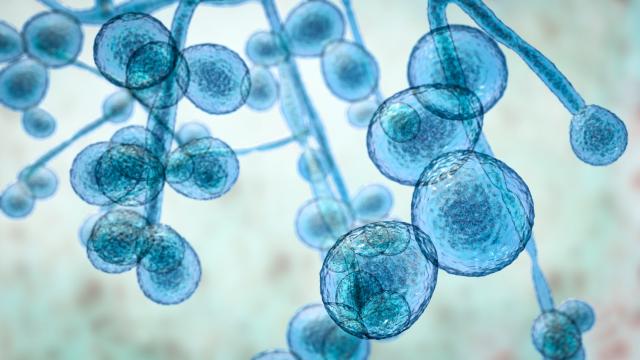The Last of Us, eat your heart out. Scientists at the University of Georgia say they’ve developed a vaccine that should be able to protect against a variety of dangerous fungi. In animal studies, the vaccine prevented severe infections and deaths from three types of fungi that often cause opportunistic illness in people. The team now plans to start early human trials.
Compared to viruses and bacteria, fungi are a less common source of disease. Among other reasons, our bodies are too hot for most fungi to survive comfortably in, and our immune system generally does a good job of keeping potential infections from running rampant. But many experts fear that climate change will lead to increased fungal disease. Even today, fungal infections do cause severe illness, especially in people who are immunocompromised or in poorer health. As more people live with conditions that at least temporarily weaken their immune system, such as those undergoing cancer treatment, fungal infections are expected to rise. These infections are harder to treat and prevent than other types, since we have very few safe antifungal drugs and no approved vaccines against them.
Researchers at the University of Georgia believe that they may have made a major step forward in protecting people from these worst-case scenarios. Their experimental vaccine is meant to boost protection in immunocompromised people against three of the most common groups of fungi known to cause fatal infections in humans: Pneumocystis, Aspergillus, and Candida. The vaccine is supposed to work by training the immune system to recognise a “pan-fungal” protein shared by these fungi, which should then strengthen our immunity against all three.
They have so far tested out their vaccine in mice and rhesus macaques. These experiments compared the outcomes of vaccinated animals against non-vaccinated animals after both groups had their immune systems deliberately suppressed and were exposed to the fungi. As hoped for, the animals produced antibodies against this pan-fungal protein. Overall, the vaccine was found effective at preventing invasive infections and deaths from the fungi. None of the vaccinated macaques exposed to Pneumocystis fungi developed the severe infection it can cause, for instance, compared to more than half that did in the unvaccinated group. The team’s results were published late last year in PNAS Nexus.
“Because it targets three different pathogens, the vaccine has the potential to be groundbreaking regarding invasive fungal infections,” said lead author Karen Norris, a professor in the College of Veterinary Medicine at UGA, in a recent statement from the university.
According to research cited by the authors, around 13 million life-threatening fungal infections occur annually worldwide. A large bulk of these infections are caused by these three fungi, while they’re estimated to account for over 80% of fungal-related deaths. Other research by some of the same authors has estimated that fungal infections rack up $US6.7 ($9) billion in direct medical costs annually in the U.S. alone.
Encouraging as these early findings are, though, the real test lies ahead. The team is preparing to start a Phase I trial of their vaccine, which will assess its safety and immune response in healthy human volunteers.
